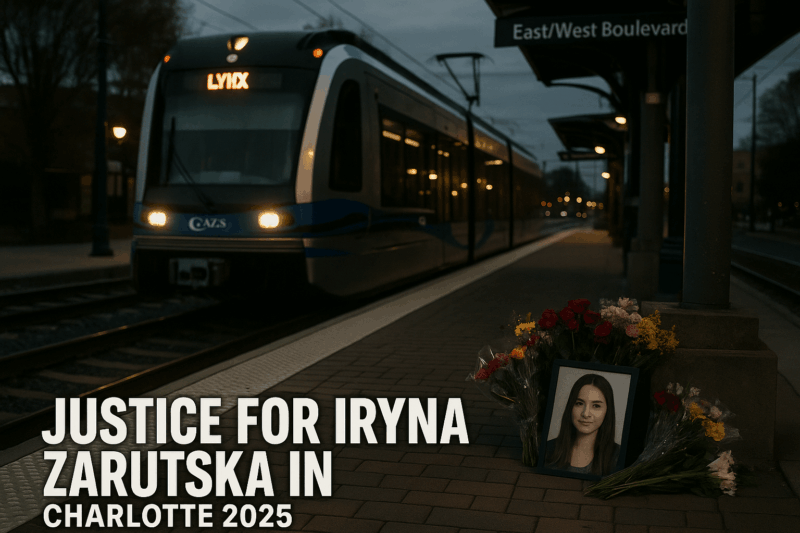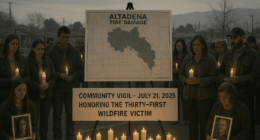A City Mourns a Senseless Loss
On August 22, 2025, Iryna Zarutska, a 23-year-old Ukrainian refugee, was fatally stabbed on a Charlotte light rail train in a random attack that has left the city reeling. Decarlos Brown Jr., 34, now faces federal charges for committing an act causing death on a mass transportation system, alongside state charges of first-degree murder. Captured on chilling surveillance video, the Charlotte train stabbing has sparked a national debate over public safety, mental health, and judicial oversight in Democratic-led cities. As the Justice Department seeks the maximum penalty, what does this tragedy reveal about systemic failures and the path to justice?
The Human Toll: A Dream Shattered
Iryna Zarutska’s story is one of courage and tragedy. Fleeing Ukraine’s war in 2022 with her mother, sister, and brother, she sought safety in Charlotte, North Carolina. A graduate of Synergy College in Kyiv with a degree in Art and Restoration, she worked at Zepeddie’s Pizzeria and studied at Rowan-Cabarrus Community College, aspiring to become a veterinary assistant. Known for her radiant smile and love for animals, her family chose to bury her in the U.S., her adopted home, rejecting an offer from the Ukrainian Embassy to repatriate her body. The Ukrainian refugee murder has left her loved ones and Charlotte’s community grappling with grief and fear, amplifying calls for safer public transit.
Facts and Figures: A Crime in Focus
The Charlotte train stabbing occurred at 9:50 p.m. on the LYNX Blue Line at the East/West Boulevard station. Surveillance footage shows Zarutska boarding at 9:46 p.m., wearing her pizzeria uniform and earbuds, sitting in front of Brown. Four minutes later, without interaction, Brown pulled a folding pocketknife from his orange sweatshirt and stabbed her three times in the neck, per an FBI affidavit. Zarutska died at the scene from a single throat wound and a knee cut. Brown, homeless and living in a shelter, was arrested on the platform after exiting at the next stop, with a blood-soaked red shirt and knife recovered nearby.
Decarlos Brown Jr.’s criminal history includes 14 arrests in Mecklenburg County since 2011, notably a 2015 conviction for robbery with a dangerous weapon, serving five years. In January 2025, he was arrested for misusing 911, claiming a “man-made” material controlled him, but was released without bond. Diagnosed with schizophrenia, his mother sought an involuntary psychiatric commitment in 2025 after violent behavior, but no action was taken. A July 2025 court-ordered competency evaluation was not completed before the attack. The federal charge, filed on September 9, 2025, carries a potential life sentence or death penalty, while North Carolina’s first-degree murder charge also allows capital punishment, though no executions have occurred since 2006 due to legal challenges over lethal injection protocols.
The Broader Context: A National Flashpoint
The Ukrainian refugee murder has become a focal point in the debate over crime in blue cities. President Trump and Attorney General Pam Bondi have blamed “soft-on-crime policies”, with Trump calling Brown a “mentally deranged lunatic” on Truth Social. U.S. Attorney Russ Ferguson labeled the attack a “terroristic act”, vowing justice. Charlotte Mayor Vi Lyles, a Democrat, called it a “tragic failure by the courts and magistrates,” noting that Mecklenburg County’s 85 prosecutors handle nearly 300 homicide cases, straining resources for mental health interventions. State Auditor Dave Boliek launched an audit of the Charlotte Area Transit System’s (CATS) safety budget, which reported no security in the train car during the attack, though officers were in the adjacent car. The case echoes broader concerns, with homicide rates in Charlotte up 15% from 2024, per local police data.
What Lies Ahead: Justice and Reform
The federal charges 2025 against Brown will run parallel to the state case, with prosecutors seeking the maximum penalty. The federal statute, used in cases like the 2022 Brooklyn subway shooting, could result in life imprisonment. Charlotte has increased transit security with bike units and urban terrain vehicles, and CATS banned Brown for life. However, experts call for systemic reforms, including better mental health interventions and stricter oversight for repeat offenders. The case may influence national policies, with Trump proposing National Guard deployments to cities like Chicago, though a similar move in Los Angeles was ruled illegal.
Addressing Systemic Failures
To prevent future tragedies, mental health funding must increase, with Mecklenburg County needing more resources for its 1,200 annual mental health court cases. Community programs and judicial reforms could ensure individuals like Brown receive treatment before escalating to violence.
Conclusion: Honoring Iryna’s Memory
The Charlotte train stabbing of Iryna Zarutska is a heartbreaking reminder of systemic gaps in public safety and mental health. As Charlotte seeks justice for a young woman who fled war only to meet violence, the nation grapples with how to protect its communities. The federal and state charges against Brown signal accountability, but broader reforms are urgent to prevent another Ukrainian refugee murder. Iryna’s legacy demands action—for safer cities and a system that prioritizes lives.






